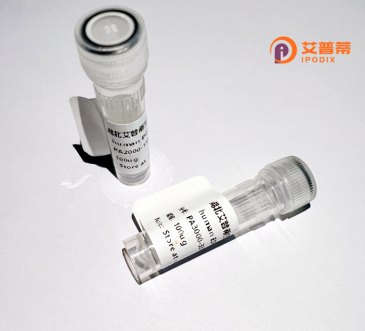
| 纯度 | >90%SDS-PAGE. |
| 种属 | Human |
| 靶点 | CORO1B |
| Uniprot No | Q9BR76 |
| 内毒素 | < 0.01EU/μg |
| 表达宿主 | E.coli |
| 表达区间 | 1-489aa |
| 氨基酸序列 | MSFRKVVRQSKFRHVFGQPVKNDQCYEDIRVSRVTWDSTFCAVNPKFLAVIVEASGGGAFLVLPLSKTGRIDKAYPTVCGHTGPVLDIDWCPHNDEVIASGSEDCTVMVWQIPENGLTSPLTEPVVVLEGHTKRVGIIAWHPTARNVLLSAGCDNVVLIWNVGTAEELYRLDSLHPDLIYNVSWNHNGSLFCSACKDKSVRIIDPRRGTLVAEREKAHEGARPMRAIFLADGKVFTTGFSRMSERQLALWDPENLEEPMALQELDSSNGALLPFYDPDTSVVYVCGKGDSSIRYFEITEEPPYIHFLNTFTSKEPQRGMGSMPKRGLEVSKCEIARFYKLHERKCEPIVMTVPRKSDLFQDDLYPDTAGPEAALEAEEWVSGRDADPILISLREAYVPSKQRDLKISRRNVLSDSRPAMAPGSSHLGAPASTTTAADATPSGSLARAGEAGKLEEVMQELRALRALVKEQGDRICRLEEQLGRMENGDA |
| 分子量 | 79.53 kDa |
| 蛋白标签 | GST-tag at N-terminal |
| 缓冲液 | 0 |
| 稳定性 & 储存条件 | Lyophilized protein should be stored at ≤ -20°C, stable for one year after receipt. Reconstituted protein solution can be stored at 2-8°C for 2-7 days. Aliquots of reconstituted samples are stable at ≤ -20°C for 3 months. |
| 复溶 | Always centrifuge tubes before opening.Do not mix by vortex or pipetting. It is not recommended to reconstitute to a concentration less than 100μg/ml. Dissolve the lyophilized protein in distilled water. Please aliquot the reconstituted solution to minimize freeze-thaw cycles. |
以下是关于重组人CORO1B蛋白的3篇参考文献概览:
---
1. **文献名称**: *"Structural and functional characterization of human coronin 1B reveals a role in actin dynamics"*
**作者**: G. Cai et al.
**摘要**: 该研究解析了重组人CORO1B蛋白的三维结构,证明其通过调控肌动蛋白丝重组参与细胞迁移。体外实验表明,CORO1B通过与Arp2/3复合物互作抑制肌动蛋白分支结构形成。
2. **文献名称**: *"Coronin 1B coordinates dendritic cell chemotaxis by regulating F-actin network remodelling"*
**作者**: J. Park et al.
**摘要**: 文章发现重组人CORO1B蛋白在树突状细胞趋化运动中起关键作用。通过CRISPR/Cas9敲除CORO1B的细胞显示肌动蛋白重排缺陷,而外源重组蛋白可部分恢复细胞迁移能力,提示其在免疫细胞运动中的调控机制。
3. **文献名称**: *"Expression and purification of recombinant human coronin 1B in E. coli for antibody production"*
**作者**: S. Lee & M. Fernández
**摘要**: 该研究建立了一种高效的大肠杆菌表达系统,纯化出高活性重组CORO1B蛋白,并通过该蛋白成功制备多克隆抗体。质谱分析验证蛋白纯度,WB实验证实抗体特异性适用于后续功能研究。
---
这些文献覆盖了结构功能分析、细胞机制研究及重组制备方法等领域,建议结合具体需求进一步检索近年研究(如CORO1B与癌症转移或自噬的关联)。
Coronin 1B (CORO1B), a member of the coronin protein family, is an actin-binding protein crucial for regulating cytoskeletal dynamics and cell motility. It is widely expressed in eukaryotic cells, particularly in immune cells, endothelial cells, and neurons. CORO1B interacts with the Arp2/3 complex and cofilin to modulate actin filament polymerization, branching, and disassembly, thereby influencing processes like cell migration, phagocytosis, and vesicular trafficking. Structurally, it contains a conserved coronin domain, a unique region, and a coiled-coil domain, which mediate its oligomerization and interactions with signaling molecules.
Recombinant human CORO1B protein is typically produced using bacterial or mammalian expression systems, often fused with tags (e.g., His, GST) for purification and detection. Its recombinant form enables functional studies in vitro, such as dissecting actin-binding mechanisms or screening for interactors via pull-down assays. Dysregulation of CORO1B has been linked to pathological conditions, including immune disorders, cancer metastasis, and neurological diseases, making it a potential therapeutic target. Current research leverages recombinant CORO1B to explore its role in T-cell activation, neuronal development, and tumor microenvironment remodeling, offering insights into disease mechanisms and novel intervention strategies.
×